How to appreciate an English poem
读诗的方法英文作文
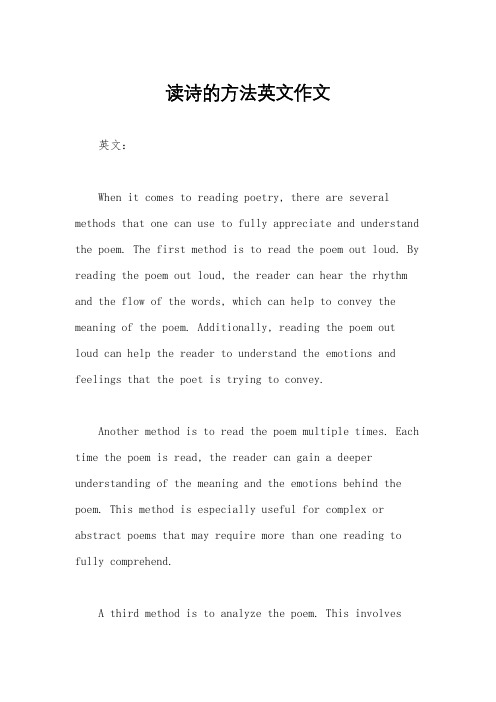
读诗的方法英文作文英文:When it comes to reading poetry, there are several methods that one can use to fully appreciate and understand the poem. The first method is to read the poem out loud. By reading the poem out loud, the reader can hear the rhythm and the flow of the words, which can help to convey the meaning of the poem. Additionally, reading the poem out loud can help the reader to understand the emotions and feelings that the poet is trying to convey.Another method is to read the poem multiple times. Each time the poem is read, the reader can gain a deeper understanding of the meaning and the emotions behind the poem. This method is especially useful for complex or abstract poems that may require more than one reading to fully comprehend.A third method is to analyze the poem. This involvesbreaking down the poem into its individual parts, such as the structure, rhyme scheme, and imagery. By analyzing these elements, the reader can gain a better understanding of the poem as a whole.Finally, it is important to approach the poem with an open mind and a willingness to explore new ideas and perspectives. Poetry is often open to interpretation, and by approaching the poem with an open mind, the reader can gain a deeper appreciation for the art form.中文:谈到阅读诗歌,有几种方法可以帮助我们更好地欣赏和理解诗歌。
如何欣赏诗歌英文作文
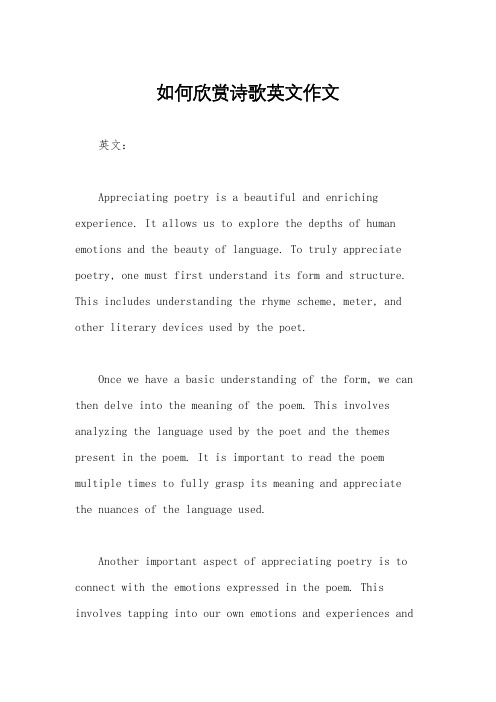
如何欣赏诗歌英文作文英文:Appreciating poetry is a beautiful and enriching experience. It allows us to explore the depths of human emotions and the beauty of language. To truly appreciate poetry, one must first understand its form and structure. This includes understanding the rhyme scheme, meter, and other literary devices used by the poet.Once we have a basic understanding of the form, we can then delve into the meaning of the poem. This involves analyzing the language used by the poet and the themes present in the poem. It is important to read the poem multiple times to fully grasp its meaning and appreciate the nuances of the language used.Another important aspect of appreciating poetry is to connect with the emotions expressed in the poem. This involves tapping into our own emotions and experiences andrelating them to the poem. For example, if a poem expresses feelings of love and loss, we can connect with those emotions if we have experienced similar feelings in our own lives.In addition, it is helpful to understand the historical and cultural context in which the poem was written. This can provide insight into the themes and language used by the poet. For example, understanding the political and social climate of the time period in which the poem was written can help us understand the poet's perspective and message.Overall, appreciating poetry requires a combination of understanding the form and structure, analyzing the language and themes, connecting with our own emotions, and understanding the historical and cultural context. It is a beautiful and enriching experience that allows us to explore the depths of human emotion and the beauty of language.中文:欣赏诗歌是一种美丽而丰富的体验。
英文古诗朗读技巧
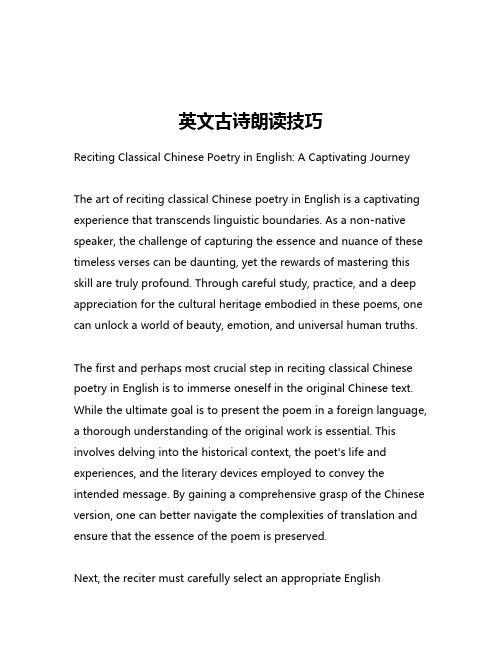
英文古诗朗读技巧Reciting Classical Chinese Poetry in English: A Captivating JourneyThe art of reciting classical Chinese poetry in English is a captivating experience that transcends linguistic boundaries. As a non-native speaker, the challenge of capturing the essence and nuance of these timeless verses can be daunting, yet the rewards of mastering this skill are truly profound. Through careful study, practice, and a deep appreciation for the cultural heritage embodied in these poems, one can unlock a world of beauty, emotion, and universal human truths.The first and perhaps most crucial step in reciting classical Chinese poetry in English is to immerse oneself in the original Chinese text. While the ultimate goal is to present the poem in a foreign language, a thorough understanding of the original work is essential. This involves delving into the historical context, the poet's life and experiences, and the literary devices employed to convey the intended message. By gaining a comprehensive grasp of the Chinese version, one can better navigate the complexities of translation and ensure that the essence of the poem is preserved.Next, the reciter must carefully select an appropriate Englishtranslation that captures the nuances and rhythmic patterns of the original. This is no easy feat, as the art of translation is itself a delicate balance between fidelity to the source material and the need to create a cohesive and engaging piece in the target language. The reciter should carefully examine multiple translations, comparing and contrasting the various interpretations, before settling on the version that resonates most strongly with their own understanding and interpretation of the poem.Once the translation has been chosen, the real work begins. Effective recitation of classical Chinese poetry in English requires a deep understanding of the poem's structure, rhythm, and emotional content. The reciter must study the text, identifying the key themes, imagery, and rhetorical devices employed by the poet. This knowledge will inform the delivery, allowing the reciter to modulate their voice, pace, and inflection to best convey the intended meaning and evoke the desired emotional response from the audience.Mastering the proper pronunciation of the English translation is also of paramount importance. While the reciter may not be a native English speaker, they must strive to deliver the poem with clarity, precision, and a natural flow. This may involve extensive practice, consultation with native speakers, and a keen attention to the nuances of English phonetics. By ensuring that the words are pronounced correctly and with appropriate emphasis, the reciter cancreate a seamless and captivating performance.Beyond the technical aspects of recitation, the true art lies in the ability to connect with the audience on an emotional level. Classical Chinese poetry often explores universal themes of love, loss, nature, and the human condition. The skilled reciter must tap into these profound sentiments and convey them through their performance, using their voice, body language, and facial expressions to create a deeply immersive experience for the listeners.In doing so, the reciter becomes a conduit, bridging the gap between the ancient Chinese poetic tradition and the modern, English-speaking audience. They are tasked with the responsibility of not only delivering the words but also evoking the essence of the poem, allowing the audience to feel the raw emotions, the vivid imagery, and the timeless wisdom that emanates from these timeless works.Ultimately, the art of reciting classical Chinese poetry in English is a testament to the power of language, culture, and human expression. It is a journey of discovery, where the reciter must navigate the complexities of translation, pronunciation, and emotional interpretation to create a captivating and meaningful experience for the audience. Through this endeavor, the reciter not only showcases their own skill and dedication but also serves as a culturalambassador, sharing the beauty and profundity of classical Chinese poetry with a wider, global audience.。
英文诗歌鉴赏
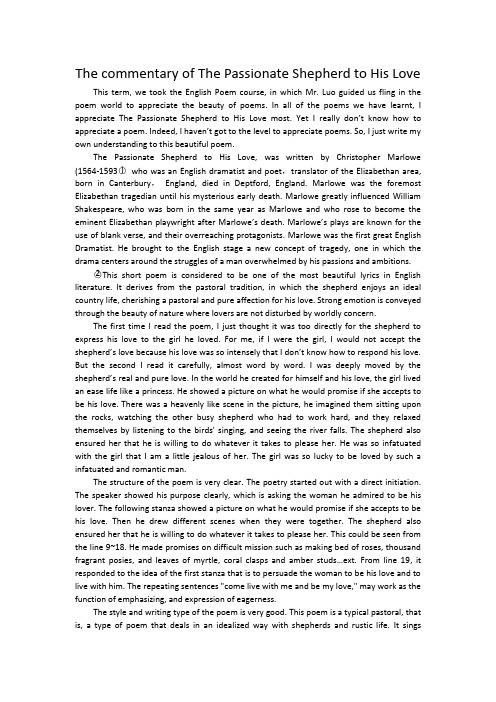
The commentary of The Passionate Shepherd to His LoveThis term, we took the English Poem course, in which Mr. Luo guided us fling in the poem world to appreciate the beauty of poems. In all of the poems we have learnt, I appreciate The Passionate Shepherd to His Love most. Yet I really don’t know how to appreciate a poem. Indeed, I haven’t got to the level to appreciate poems. So, I just write my own understanding to this beautiful poem.The Passionate Shepherd to His Love, was written by Christopher Marlowe (1564-1593○)who was an English dramatist and poet,translator of the Elizabethan area, born in Canterbury,England, died in Deptford, England. Marlowe was the foremost Elizabethan tragedian until his mysterious early death. Marlowe greatly influenced William Shakespeare, who was born in the same year as Marlowe and who rose to become the eminent Elizabethan playwright after Marlowe’s death. Marlowe’s plays are known for the use of blank verse, and their overreaching protagonists. Marlowe was the first great English Dramatist. He brought to the English stage a new concept of tragedy, one in which the drama centers around the struggles of a man overwhelmed by his passions and ambitions.○2This short poem is considered to be one of the most beautiful lyrics in English literature. It derives from the pastoral tradition, in which the shepherd enjoys an ideal country life, cherishing a pastoral and pure affection for his love. Strong emotion is conveyed through the beauty of nature where lovers are not disturbed by worldly concern.The first time I read the poem, I just thought it was too directly for the shepherd to express his love to the girl he loved. For me, if I were the girl, I would not accept the shepherd’s love because his love was so intensely that I don’t know how to respond his love. But the second I read it carefully, almost word by word. I was deeply moved by the shepherd’s real and pure love. In the world he created for himself and his love, the girl lived an ease life like a princess. He showed a picture on what he would promise if she accepts to be his love. There was a heavenly like scene in the picture, he imagined them sitting upon the rocks, watching the other busy shepherd who had to work hard, and they relaxed themselves by listening to the birds' singing, and seeing the river falls. The shepherd also ensured her that he is willing to do whatever it takes to please her. He was so infatuated with the girl that I am a little jealous of her. The girl was so lucky to be loved by such a infatuated and romantic man.The structure of the poem is very clear. The poetry started out with a direct initiation. The speaker showed his purpose clearly, which is asking the woman he admired to be his lover. The following stanza showed a picture on what he would promise if she accepts to be his love. Then he drew different scenes when they were together. The shepherd also ensured her that he is willing to do whatever it takes to please her. This could be seen from the line 9~18. He made promises on difficult mission such as making bed of roses, thousand fragrant posies, and leaves of myrtle, coral clasps and amber studs…ext. From line 19, it responded to the idea of the first stanza that is to persuade the woman to be his love and to live with him. The repeating sentences "come live with me and be my love," may work as the function of emphasizing, and expression of eagerness.The style and writing type of the poem is very good. This poem is a typical pastoral, that is, a type of poem that deals in an idealized way with shepherds and rustic life. It singsheartily for the pure and faithful love, which is the most beautiful thing in the world. The poem brings us to valleys, grooves, hills and fields, entertaining us with a joyous song flowing naturally from the heart of a lovely and harmonious picture of shepherds, sheep, roses and so on. In the beginning, the poet sketched a peaceful and fine view of shepherd’s surrounding, such as hills, valleys, all of which seemed essential in pastoral poetries. Then the shepherd promised his lover to give her what he can to make her happy, including “beds of roses”,” cap of flowers”, ”belt of straw an d ivy-buds”. The writer showed pure and immortal love by reciting excellent verse .It also gives us a hint that though the flowers might wither and fall, human being’s faithful and sincere love won’t fade away. Besides, the word in this poetry is simple but elegant, which makes the poem so appealing to our hearts, especially to our ears. The poem impresses me with its musical beauty, and the real and pure feeling.The theme of the poem is very simple. The apparent theme is the rapture of springtime love in a simple. Inner in this theme is the motif of carpe diem—Latin for “seize the day.” Carpe diem urges people to enjoy the moment without worrying about the future.The characters in the poem are also very impressed. The Passionate Shepherd: He importuned a woman-a young and pretty country girl-to become his sweetheart and enjoy with him all the pleasures that nature has to offer. He promises to his love a fanciful, and somehow an unrealistic future.Maybe the shepherd does not rank high in the society; he is probably not wealthy at all. However, he is a very poetic person. That was the leading man, a very passionate, romantic man. The Shepherd’s Love: The young woman who receives the Passionate Shepherd’s message. Even the poet didn’t describe her personality or appearance, we can image that she must be a very charming girl, otherwise the shepherd would not be so passionate with her. Swains: Young country fellows whom the Passionate Shepherd promises will dance for his beloved.So, in a word, this is a romantic poem, amorous shepherds in three sigh, in poetic language, describes the imagination and in love with the happy days spent, show the desire for love. And love together nestled in the corner, listening to the wind by steps, see the world of beauty.I like the poem because it captures the joy of simple, uncomplicated and pure love. The shepherd does not worry whether his status makes him acceptable to the girl; nor does he appear concerned about money or education. The future will take carry of itself. What matters is the moment. So, he says, let us enjoy it—sitting on a rock listening to the birds. The shepherd teaches us that we should chase for what we what bravely, no matter what difficulty we may face.○1《英美文学选读》,张伯香主编,1998,外语教学与研究出版社○2/view/1846580.htm百度百科。
怎样去欣赏诗歌英语作文

怎样去欣赏诗歌英语作文英文,To appreciate poetry, one must first understand the essence of the art form. Poetry is a means of expression that uses language and imagery to evoke emotions and convey ideas. It is a form of literary art that often employs rhythm and meter, as well as figurative language such as metaphors and similes. 。
One way to appreciate poetry is to read it aloud. The rhythm and sounds of the words can have a powerful impact when spoken, and can enhance the overall experience of the poem. For example, when I read a poem like "The Road Not Taken" by Robert Frost, I can feel the sense of contemplation and introspection as I speak the words out loud.Another way to appreciate poetry is to analyze its structure and form. Understanding the use of stanzas, rhyme scheme, and meter can provide insight into the poet's intentions and enhance the overall understanding of thepoem. For instance, when I study a poem like "Sonnet 18" by William Shakespeare, I can appreciate the skillful use of iambic pentameter and the intricacy of the rhyme scheme.Furthermore, it is important to pay attention to the imagery and symbolism used in poetry. Poets often use vivid and evocative language to create powerful images that resonate with the reader. For example, when I read a poem like "The Raven" by Edgar Allan Poe, I can appreciate the haunting imagery and the symbolic significance of the raven as a harbinger of doom.In addition, understanding the historical and cultural context of a poem can also deepen one's appreciation for it. For example, when I learn about the social and political climate of Emily Dickinson's time, I can better understand the themes and messages in her poetry.Overall, to appreciate poetry, one must engage with it on a deeper level, paying attention to its language, structure, imagery, and context. By doing so, one can truly appreciate the artistry and beauty of poetry.中文,要欣赏诗歌,首先必须理解这种艺术形式的本质。
鉴赏英语诗歌模板作文
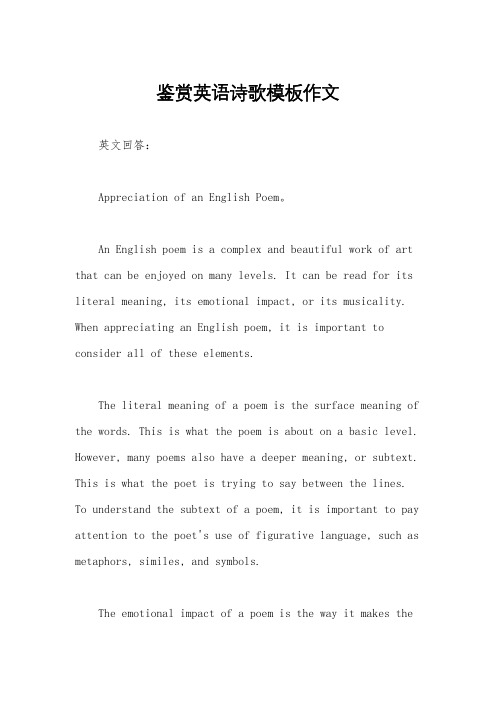
鉴赏英语诗歌模板作文英文回答:Appreciation of an English Poem。
An English poem is a complex and beautiful work of art that can be enjoyed on many levels. It can be read for its literal meaning, its emotional impact, or its musicality. When appreciating an English poem, it is important to consider all of these elements.The literal meaning of a poem is the surface meaning of the words. This is what the poem is about on a basic level. However, many poems also have a deeper meaning, or subtext. This is what the poet is trying to say between the lines. To understand the subtext of a poem, it is important to pay attention to the poet's use of figurative language, such as metaphors, similes, and symbols.The emotional impact of a poem is the way it makes thereader feel. Some poems are meant to make us laugh, while others are meant to make us cry. Some poems are angry, while others are peaceful. The emotional impact of a poem is often conveyed through the poet's use of language, rhythm, and rhyme.The musicality of a poem is the way it sounds when it is read aloud. Some poems are meant to be read quickly, while others are meant to be read slowly. Some poems have a regular rhythm, while others have a more free-form rhythm. The musicality of a poem can help to create a certain mood or atmosphere.When appreciating an English poem, it is important to consider all of these elements: the literal meaning, the emotional impact, and the musicality. By doing so, you will be able to fully appreciate the beauty and complexity of the poem.中文回答:如何鉴赏一首英语诗歌。
怎样去欣赏诗歌英语作文

怎样去欣赏诗歌英语作文Appreciating poetry in English is a delightful journey that can enrich your understanding of language, culture, and emotions. Here are some tips on how to appreciate English poetry:1. Understand the Basics: Before delving deep into poetry, it's essential to grasp the basic elements such as rhyme, meter, imagery, and symbolism. Understanding these components helps in deciphering the poet's message and appreciating their craft.2. Read Aloud: Poetry is meant to be heard as well as read. Reading aloud allows you to experience the rhythm and flow of the language, enhancing your appreciation for the poet's choice of words and their arrangement. It also helps in understanding the intended tone and mood of the poem.3. Consider the Context: Context plays a significant role in understanding poetry. Familiarize yourself with thehistorical, cultural, and biographical background of the poet. This knowledge provides insights into the themes, motifs, and symbolism employed in the poem.4. Analyze the Structure: Pay attention to thestructure of the poem, including its form and organization. Different forms such as sonnets, ballads, or free versehave unique structures that influence the meaning andimpact of the poem.5. Explore Themes and Imagery: Look beyond the surface meaning of the words and explore the underlying themes and imagery. Poets often use metaphor, simile, and otherliterary devices to evoke emotions and convey complex ideas. Analyzing these elements deepens your understanding and appreciation of the poem.6. Interpretation and Personal Response: Poetry invites interpretation and personal reflection. Don't be afraid to interpret the poem in your own way and relate it to yourown experiences and emotions. Your personal response adds depth to your appreciation of the poem and allows you toconnect with it on a deeper level.7. Study Different Poets and Styles: Expose yourself toa variety of poets and poetic styles. Each poet has aunique voice and perspective, and exploring diverse works broadens your understanding of poetry as an art form. From the classical verses of Shakespeare to the modernist experiments of T.S. Eliot, there is a wealth of poetry to explore.8. Join a Poetry Group or Workshop: Engaging withothers who share your interest in poetry can enhance your appreciation and understanding. Joining a poetry group or workshop provides opportunities for discussion, feedback, and exposure to different interpretations, enriching your experience as a reader and enthusiast of poetry.9. Keep an Open Mind: Poetry can be challenging and ambiguous at times, but approaching it with an open mind allows you to appreciate its beauty and complexity. Embrace the ambiguity and explore multiple interpretations,allowing the poem to unfold its layers of meaning over time.In conclusion, appreciating English poetry is a rewarding endeavor that requires patience, curiosity, and an openness to interpretation. By understanding the basics, exploring diverse works, and engaging with the poetry community, you can deepen your appreciation and enjoyment of this timeless art form.。
how_to_appreciate_poetry.doc

The earliest poetic forms were epics and balllads sung by travelling bards and minstrels.
1. Definition of poetry
“Poetry is a kind of representation using rhythm, speech and melody.” —Aristotle "poetry is the spontaneous overflow of powerful feelings: it takes its origin from emotion recollected in tranquility" — William Wordsworth "Poetry , in a general sense, may be defined to be the expression of the imagination."—P.B.Shelly Poetry is to prose as dancing is to walking. —British novelist and poet,John Wain, 1976
Images Perceptual imagery: concrete , touch 实际, 感官意向 Appeals to: visual sense 圆规西施, 阿Q/ auditory sense 磨刀霍霍向猪羊/ olfactory sense: 嗅觉 臭豆腐/ tactile sense Conceptual imagery:figures of speech : emotive, cognitive
A Red ,Red Rose Robert Burns 1759–1796
怎样欣赏诗歌英文作文高中
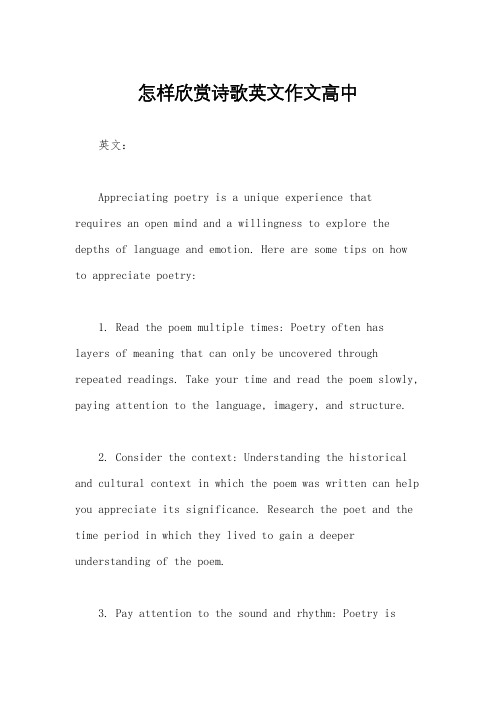
怎样欣赏诗歌英文作文高中英文:Appreciating poetry is a unique experience that requires an open mind and a willingness to explore the depths of language and emotion. Here are some tips on how to appreciate poetry:1. Read the poem multiple times: Poetry often has layers of meaning that can only be uncovered through repeated readings. Take your time and read the poem slowly, paying attention to the language, imagery, and structure.2. Consider the context: Understanding the historical and cultural context in which the poem was written can help you appreciate its significance. Research the poet and the time period in which they lived to gain a deeper understanding of the poem.3. Pay attention to the sound and rhythm: Poetry ismeant to be read aloud, so pay attention to the way the words sound and flow together. Notice the rhythm and meter of the poem, and how it contributes to the overall meaning.4. Look for themes and symbols: Poetry often uses symbols and metaphors to convey deeper meanings. Look for recurring themes and symbols throughout the poem, and consider what they might represent.5. Connect with your emotions: Poetry can evoke strong emotions, so allow yourself to feel the words and connect with the emotions they convey. Don't be afraid to let the poem move you.For example, one of my favorite poems is "The Love Song of J. Alfred Prufrock" by T.S. Eliot. The poem is full of complex language and imagery, but by reading it multiple times and considering the context in which it was written, I was able to appreciate its significance. The themes of isolation and insecurity resonated with me on a personal level, and the use of repetition and fragmented structure added to the overall feeling of unease in the poem.中文:欣赏诗歌是一种独特的体验,需要开放的心态和探索语言和情感深度的意愿。
学会欣赏英语古诗专题讲座英语作文
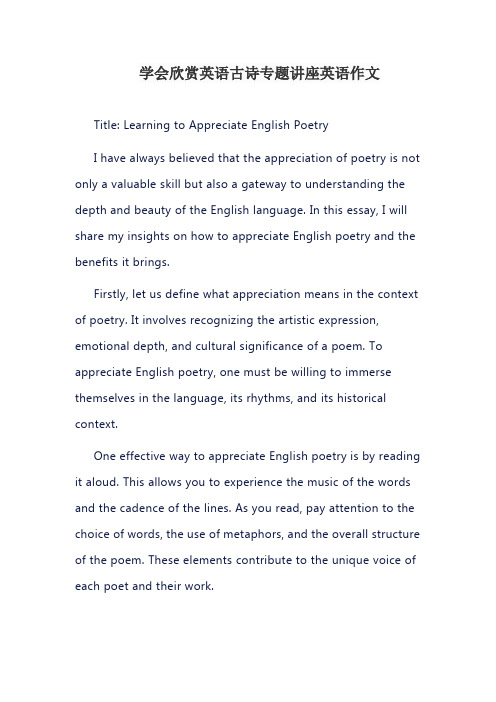
学会欣赏英语古诗专题讲座英语作文Title: Learning to Appreciate English PoetryI have always believed that the appreciation of poetry is not only a valuable skill but also a gateway to understanding the depth and beauty of the English language. In this essay, I will share my insights on how to appreciate English poetry and the benefits it brings.Firstly, let us define what appreciation means in the context of poetry. It involves recognizing the artistic expression, emotional depth, and cultural significance of a poem. To appreciate English poetry, one must be willing to immerse themselves in the language, its rhythms, and its historical context.One effective way to appreciate English poetry is by reading it aloud. This allows you to experience the music of the words and the cadence of the lines. As you read, pay attention to the choice of words, the use of metaphors, and the overall structure of the poem. These elements contribute to the unique voice of each poet and their work.Another crucial aspect of appreciating English poetry is understanding its historical context. Many poems were written during specific periods in history and reflect the social, political, or cultural climate of that time. By familiarizing yourself with the background of a poem, you can gain a deeper appreciation for its meaning and impact.In addition to reading and analyzing poetry, attending lectures and workshops on English poetry can further enhance your appreciation. These events often provide expert insights into the works of famous poets and offer opportunities for discussion and interpretation. Through these experiences, you can broaden your understanding of different poetic styles and techniques.Appreciating English poetry not only enriches your knowledge of the language but also fosters a deeper connection to its culture and history. It allows you to appreciate the artistry behind the words and the emotions they convey. As an English teacher, I encourage my students to explore this beautiful aspect of our language and discover the joys of English poetry.。
How to read an English poem

STEP 2
Look up new words in a dictionary.
STEP 3 STEP 4
Identify the sentence structure, for poetry at times consists of complicated sentences.
Be alert for figures of speech.
“he watches” he is skilful waits for the right moment before diving.
crawls” the sea appears slow and tame from his perspective.
The wrinkled sea beneath him crawls; He watches from his mountain walls, And like a thunderbolt he falls.
Something of the spirit of the original works is lost.
Rhythm
rhyme etc.
figures of speech
2.basic terminologies about poems.
stanza: a group of lines set off from the other lines in a poem. It is the poetic equivalent of a paragraph in prose.
The wrinkled sea beneath him crawls; He watches from his mountain walls, And like a thunderbolt he falls.
How_to_Appreciate_Poetry
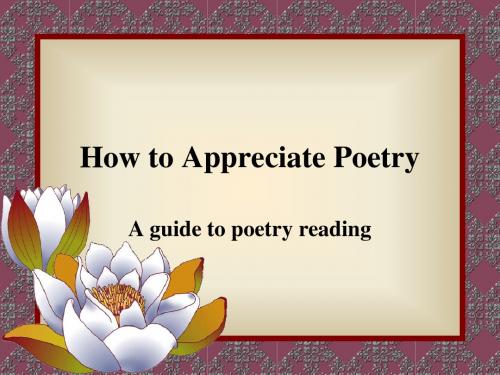
17th century poets
• John Milton, his religious ideas are influential; • Lycidas, a famous elegy; Samson Agonistes, a tragedy; Paradise Lost, his masterpiece.
Prosperity of poetry in 16th century
• Edmund Spenser, Christopher Marlowe and William Shakespeare. • Italian sonnet, introduced by Thomas Wyatt; • Rhyme: abba abba cddc ee • English rhyme: abab cdcd efef gg, also Shakespearean sonnet.
Neoclassicism
• A revival of classical standards of order, balance, and harmony in literature; • Alexander Pope
Sentimentalism
• Emotion and sentiment are emphasized; • Thomas Gray’s Elegy Written in a Country Churchyard, a great meditative lyrics. • Other poets: Robert Burns, a lyrical poet and William Blake, a mystical poet.
How to Appreciate Poetry
A guide to poetry reading
英语诗歌鉴赏的英文作文
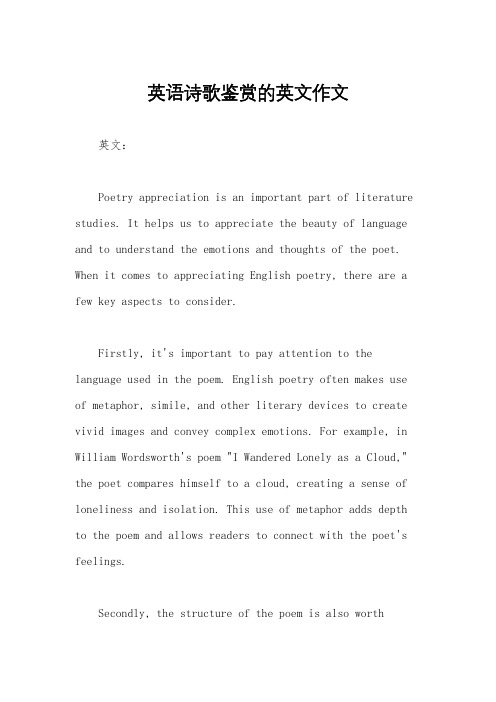
英语诗歌鉴赏的英文作文英文:Poetry appreciation is an important part of literature studies. It helps us to appreciate the beauty of language and to understand the emotions and thoughts of the poet. When it comes to appreciating English poetry, there are a few key aspects to consider.Firstly, it's important to pay attention to the language used in the poem. English poetry often makes use of metaphor, simile, and other literary devices to create vivid images and convey complex emotions. For example, in William Wordsworth's poem "I Wandered Lonely as a Cloud," the poet compares himself to a cloud, creating a sense of loneliness and isolation. This use of metaphor adds depth to the poem and allows readers to connect with the poet's feelings.Secondly, the structure of the poem is also worthconsidering. English poetry comes in various forms, such as sonnets, ballads, and free verse. Each form has its own unique characteristics and can evoke different emotions in the reader. For instance, a sonnet often follows a strict rhyme scheme and meter, creating a sense of order and harmony, while free verse allows for more freedom and experimentation. Understanding the form of a poem can help us to appreciate the poet's craftsmanship and the impact of their choices on the reader.Furthermore, the themes and symbols in the poem are important to consider. Many English poems explore universal themes such as love, nature, and the passage of time. For example, in Robert Frost's "The Road Not Taken," the poet uses the symbol of a road to represent the choices we make in life. By analyzing the themes and symbols in a poem, we can gain a deeper understanding of its meaning and significance.In addition, it's essential to consider the historical and cultural context in which the poem was written. English poetry has a rich tradition that spans centuries, and manypoems are influenced by the social and political events of their time. For example, the Romantic poets of the 19th century often celebrated the beauty of nature as a response to the industrialization and urbanization of their era. Understanding the historical and cultural context can enrich our appreciation of the poem and shed light on the poet's intentions.In conclusion, the appreciation of English poetry involves paying attention to the language, structure, themes, and context of the poem. By considering these aspects, we can gain a deeper understanding of the poet's work and the emotions and ideas they seek to convey.中文:诗歌鉴赏是文学研究的重要组成部分。
关于你请教他人英语诗歌朗诵英语作文
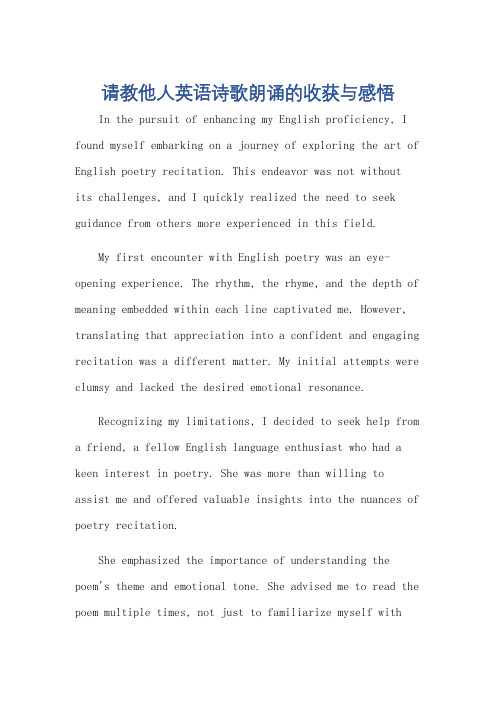
请教他人英语诗歌朗诵的收获与感悟In the pursuit of enhancing my English proficiency, I found myself embarking on a journey of exploring the art of English poetry recitation. This endeavor was not withoutits challenges, and I quickly realized the need to seek guidance from others more experienced in this field.My first encounter with English poetry was an eye-opening experience. The rhythm, the rhyme, and the depth of meaning embedded within each line captivated me. However, translating that appreciation into a confident and engaging recitation was a different matter. My initial attempts were clumsy and lacked the desired emotional resonance.Recognizing my limitations, I decided to seek help from a friend, a fellow English language enthusiast who had a keen interest in poetry. She was more than willing toassist me and offered valuable insights into the nuances of poetry recitation.She emphasized the importance of understanding the poem's theme and emotional tone. She advised me to read the poem multiple times, not just to familiarize myself withthe words but also to grasp the underlying message and feelings. This understanding, she explained, was crucialfor conveying the poem's essence through my voice.Moreover, she coached me on the technical aspects of recitation, such as pacing, volume, and pronunciation. She demonstrated how to adjust my speed to match the poem's rhythm and how to use my voice to emphasize certain words or phrases. She also corrected my pronunciation ofdifficult words, ensuring that my recitation was both accurate and audible.With her guidance, I gradually improved my recitation skills. Each practice session brought me closer to my goal of delivering a powerful and moving performance. The process was not without its challenges, but the sense of achievement that came with overcoming them was immense.In conclusion, seeking help from my friend was apivotal moment in my journey of exploring English poetry recitation. Her insights and guidance not only improved my recitation skills but also deepened my appreciation for the artform. I am grateful for the opportunity to learn from her and for the growth it has brought me.**请教他人英语诗歌朗诵的收获与感悟**在追求提升英语水平的道路上,我踏上了探索英语诗歌朗诵艺术的旅程。
如何学好英语的诗词作文
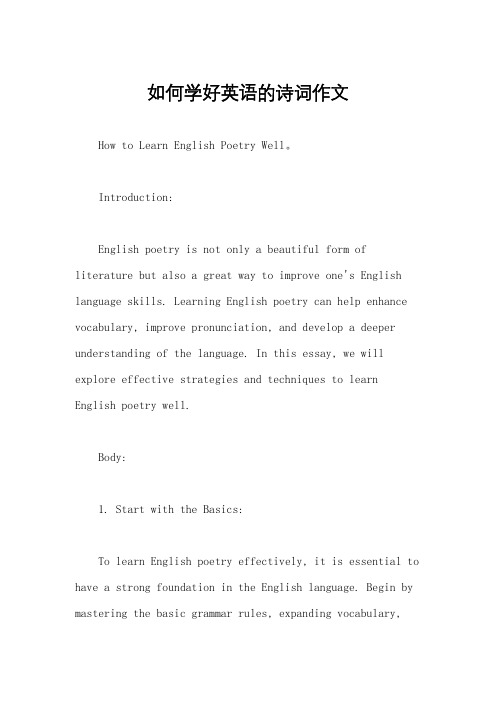
如何学好英语的诗词作文How to Learn English Poetry Well。
Introduction:English poetry is not only a beautiful form ofliterature but also a great way to improve one's English language skills. Learning English poetry can help enhance vocabulary, improve pronunciation, and develop a deeper understanding of the language. In this essay, we will explore effective strategies and techniques to learn English poetry well.Body:1. Start with the Basics:To learn English poetry effectively, it is essential to have a strong foundation in the English language. Begin by mastering the basic grammar rules, expanding vocabulary,and improving pronunciation. This will provide a solid base for understanding and appreciating the nuances of poetry.2. Read Widely:Reading extensively is crucial to developing an understanding of different poetic styles, themes, and structures. Start with classic English poets like William Shakespeare, Robert Frost, or Emily Dickinson. Explore various genres, such as sonnets, ballads, and haikus, to gain exposure to different forms of poetry.3. Analyze Poems:Analyzing poems is an effective way to comprehend their deeper meaning and literary techniques. Pay attention to the poet's use of metaphors, similes, alliteration, and other literary devices. Understand the context, themes, and emotions conveyed in the poem. This analysis will enhance your ability to appreciate and interpret poetry.4. Memorize and Recite:Memorizing and reciting poems is an excellent way to internalize the language and rhythm of poetry. Choose poems that resonate with you and practice reciting them aloud. Pay attention to the stress and intonation patterns, as they contribute to the overall musicality of the poem. Regular recitation will improve pronunciation and fluency.5. Write Your Own Poetry:Writing your own poetry allows you to apply the techniques and styles you have learned. Start by experimenting with simple forms like limericks or haikus. Focus on expressing your thoughts and emotions creatively. Writing poetry will help you develop a deeper connection with the language and enable you to express yourself more effectively.6. Join Poetry Clubs or Workshops:Engaging with fellow poetry enthusiasts can provide valuable feedback and insights. Join local poetry clubs orworkshops where you can share your own work and learn from others. Collaborating with like-minded individuals will inspire you and expose you to different perspectives and styles.7. Utilize Online Resources:Take advantage of the numerous online resourcesavailable to learn English poetry. Websites, podcasts, and YouTube channels dedicated to poetry analysis andrecitation can be immensely helpful. Participate in online forums and discussions to connect with other learners and experts in the field.Conclusion:Learning English poetry is not just about memorizing words; it is an art form that requires understanding, appreciation, and expression. By following these strategies, you can develop a deep love for English poetry and improve your language skills simultaneously. Embrace the beauty ofEnglish poetry and let it inspire and guide you on your language learning journey.。
如何欣赏英文诗作文

如何欣赏英文诗作文下载温馨提示:该文档是我店铺精心编制而成,希望大家下载以后,能够帮助大家解决实际的问题。
文档下载后可定制随意修改,请根据实际需要进行相应的调整和使用,谢谢!并且,本店铺为大家提供各种各样类型的实用资料,如教育随笔、日记赏析、句子摘抄、古诗大全、经典美文、话题作文、工作总结、词语解析、文案摘录、其他资料等等,如想了解不同资料格式和写法,敬请关注!Download tips: This document is carefully compiled by theeditor. I hope that after you download them,they can help yousolve practical problems. The document can be customized andmodified after downloading,please adjust and use it according toactual needs, thank you!In addition, our shop provides you with various types ofpractical materials,such as educational essays, diaryappreciation,sentence excerpts,ancient poems,classic articles,topic composition,work summary,word parsing,copyexcerpts,other materials and so on,want to know different data formats andwriting methods,please pay attention!First of all, you can focus on the rhythm and rhyme of the English poem. Notice how the words flow and create a musical effect. It can be really fascinating.Another thing is to pay attention to the imagery and language used. See how vividly the poet describes things and evokes emotions. It's like entering a whole new world.Also, think about the themes and messages in the poem. What is the poet trying to convey? How does it make you feel?And don't forget to appreciate the creativity and uniqueness of the poet's expression. The way they put words together can be truly amazing.Sometimes, just let the poem wash over you and experience the emotions it brings out. Don't overanalyze everything, just enjoy the moment.。
高考英语作文朗读诗词技巧
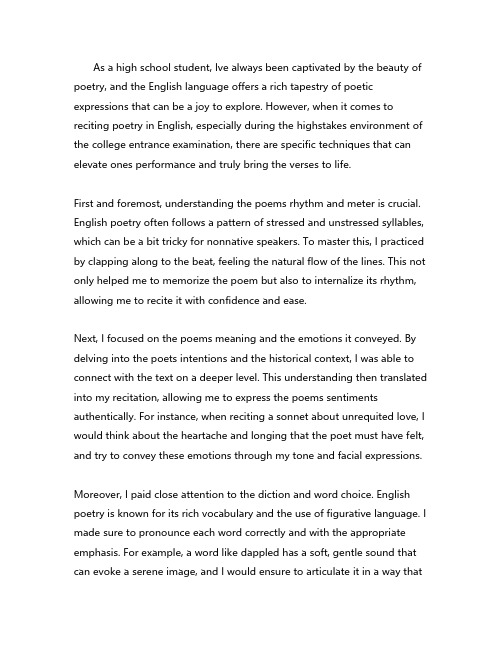
As a high school student, Ive always been captivated by the beauty of poetry, and the English language offers a rich tapestry of poetic expressions that can be a joy to explore. However, when it comes to reciting poetry in English, especially during the highstakes environment of the college entrance examination, there are specific techniques that can elevate ones performance and truly bring the verses to life.First and foremost, understanding the poems rhythm and meter is crucial. English poetry often follows a pattern of stressed and unstressed syllables, which can be a bit tricky for nonnative speakers. To master this, I practiced by clapping along to the beat, feeling the natural flow of the lines. This not only helped me to memorize the poem but also to internalize its rhythm, allowing me to recite it with confidence and ease.Next, I focused on the poems meaning and the emotions it conveyed. By delving into the poets intentions and the historical context, I was able to connect with the text on a deeper level. This understanding then translated into my recitation, allowing me to express the poems sentiments authentically. For instance, when reciting a sonnet about unrequited love, I would think about the heartache and longing that the poet must have felt, and try to convey these emotions through my tone and facial expressions.Moreover, I paid close attention to the diction and word choice. English poetry is known for its rich vocabulary and the use of figurative language. I made sure to pronounce each word correctly and with the appropriate emphasis. For example, a word like dappled has a soft, gentle sound that can evoke a serene image, and I would ensure to articulate it in a way thatbrought out its full effect.In addition to the technical aspects, I also worked on my body language and eye contact. A good recitation is not just about the words its about the entire performance. I practiced standing confidently, making purposeful gestures, and maintaining eye contact with my imaginary audience. This helped me to engage with the poem and deliver it in a way that was both captivating and memorable.Furthermore, I made use of visual aids and props when appropriate. For a poem about nature, I might incorporate leaves or flowers into my recitation. For a poem about a historical event, I could use a relevant prop to set the scene. These elements added an extra layer of depth to my performance and made the recitation more immersive.I also learned the importance of pacing. A poem should not be rushed, nor should it drag on. I practiced reciting at a pace that allowed each word to be heard clearly while still maintaining the poems natural rhythm. This required a delicate balance, but once achieved, it greatly enhanced the overall impact of my recitation.Lastly, I made sure to practice, practice, practice. Reciting poetry is a skill that improves with repetition. I would recite my chosen poem multiple times, each time focusing on a different aspect, whether it was pronunciation, emotion, or pacing. This consistent practice not only helped me to memorize the poem but also to refine my delivery.In conclusion, reciting English poetry for the college entrance examination is an art form that requires a combination of technical skill, emotional connection, and performance prowess. By focusing on these elements and dedicating time to practice, one can deliver a recitation that is not only accurate but also engaging and impactful. Its a challenge, but with dedication and the right techniques, its a challenge that can be met and even mastered.。
- 1、下载文档前请自行甄别文档内容的完整性,平台不提供额外的编辑、内容补充、找答案等附加服务。
- 2、"仅部分预览"的文档,不可在线预览部分如存在完整性等问题,可反馈申请退款(可完整预览的文档不适用该条件!)。
- 3、如文档侵犯您的权益,请联系客服反馈,我们会尽快为您处理(人工客服工作时间:9:00-18:30)。
How to appreciate an English poemThe poetic forms of English poetry are in a great variety. There are the heroic couplet, which includes a pair of rhymed lines in each stanza( which consists of four lines); the blank verse, which is unrhymed; and the sonnet, which includes 14 lines with a fixed rhyming scheme.一、英雄偶体诗Heroic Couplet refers to lines of iambic pentameter which rhyme in pairs: aa, bb, cc, and so on. The adjective “heroic” was applied in the later seventeenth century because of the frequent use of such couplets in heroic poems and dramas. This verse form was introduced into English poetry by Geoffrey Chaucer. From the age of John Dryden through that of Samuel Johnson, the heroic couplet was the predominant English measure for all the poetic kinds; some poets, including Alexander Pope, used it almost to the exclusion of other meters.英雄偶体诗的诗句采用抑扬格五音步,韵式为:aa,bb,cc......。
修饰语“英雄”使用于17世纪晚期,因为这种类型的偶体诗常用于史诗和英雄剧。
这种韵式最早被诗人乔叟引入英国,从德莱顿到萨缪尔,英雄偶体成为了英国诗歌韵式的主流,包括蒲柏在内的一些诗人几乎只用这一韵式。
O could I flow like thee, and make thy streamMy great example, as it is my theme!Though deep yet clear, though gentle yet not dull;Strong without rage, without o'erflowing full.二、注意meter(格律、节拍)和foot(音步)的区别The most common meter in English poetry, the so-called iambic pentameter, is a sequence of five iambic feet or iambs, each consisting of an unstressed syllable followed by a stressed one ("da-DUM")An iambic foot is an unstressed syllable followed by a stressed syllable. The rhythm can be written as:A line of iambic pentameter is five iambic feet in a row:It's possible to notate this with a '˘'(Breve) mark representing an unstressed syllable and a '/'(Forward Slash) mark representing a stressed syllable. In this notation a line of iambic pentameter would look like this:The following line from John Keats' Ode to Autumn is a straightforward example: To swell the gourd, and plump the hazel shellsThe scansion(节奏[韵律]分析)of this can be notated as follows:The divisions between feet are marked with a |, and the caesura (a pause) with a double vertical bar ||.˘/ ˘/ ˘/ ˘/ ˘/To swell | the gourd, || and plump | the ha- | zel shellsEg:A Red, Red Rose-----Robert BurnsO, my love is like a red, red roseThat's newly sprung in June.O, my love is like the melody,That's sweetly play’d in tune.As fair art thou, my bonnie lass,So deep in love am I,And I will love thee still, my dear,Till a’ the seas gang dry.Till a' the seas gang dry, my dear,And the rocks melt wi' the sun!And I will love thee still, my dearWhile the sands o' life shall run.And fare thee weel, my only Love!And fare thee weel, awhile!And I will come again, my love,Tho' it were ten thousand mile!Meaning:The beauty of my love can be compared with a red rose, and the sweet voice and shape of my love are like piece of soft music.My graceful girl, you are very beautiful and I love you very much; my dear, I will love you firmly until all the seas go dry. The speaker expresses his fiery passion for his love and swears to love her forever.My dear, I will love you till all the seas go dry and the rocks melt with the sun. I will love you firmly so long there is a life keeping time or I will love you until the end of my life.Farewell to you, my only dear love, farewell to you only for a short time! I will come back again even though it were ten thousand mile away, my dear!Theme: to express strong affection to his love, swearing that he will love her for ever.Structure:1.Stanza 1: compare his sweet heart as a red rose and sweet music.2. Stanza 2-3 : swear that he will love her for ever, and assure that he will never change his heart.3. Stanza 4: assure his lover that he will leave for a short time but will come back no matter how far it is.Form: Scottish Folklore, short lines, strong rhythm. The first and third lines have 8 syllables and the second and fourth lines have 6 syllable in the first two stanzas and 7 syllables in the second two stanzas.Rhyming: the first and second stanzas: abcb. The third and fourth: abab. Rhetorical features: simile is used to express the strong affection which can not be controlled. And repetition is use to intensify his emotion.三、十四行诗的韵式(rhyme scheme)及其他韵式介绍十四行诗,又译“商籁体”,为意大利文sonetto,英文Sonnet、法文sonnet的音译。
欧洲一种格律严谨的抒情体诗(lyric poetry)。
(一)意大利十四行诗(皮特拉克十四行诗)意大利十四行诗由Giacomo da Lentini(连蒂尼)创造。
皮特拉克(Petrarch)的创作使其臻于完美,又称“彼特拉克体”(Petrarchan Sonnet),后传到欧洲各国。
